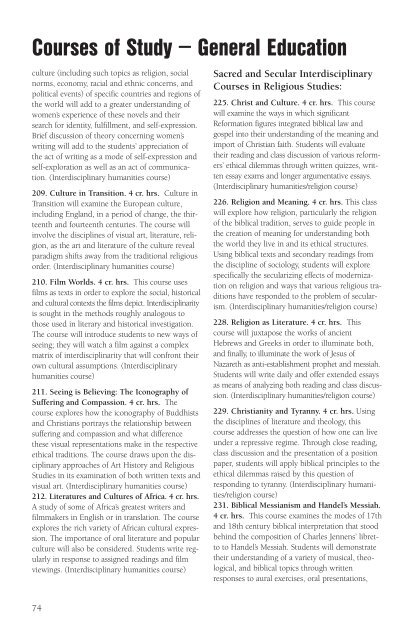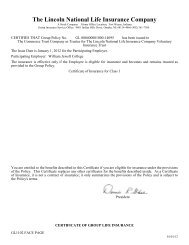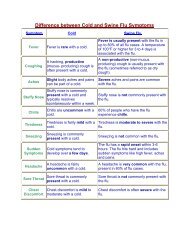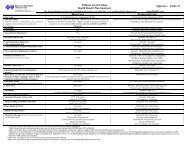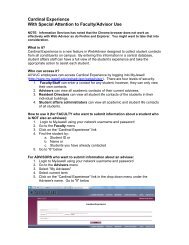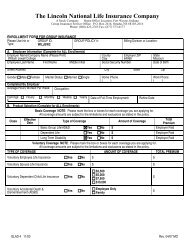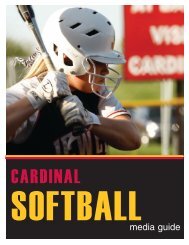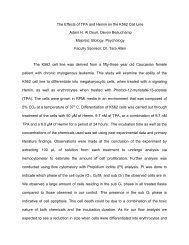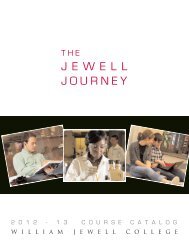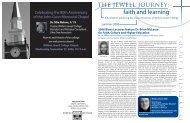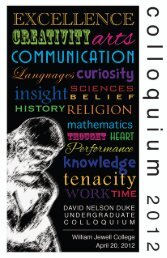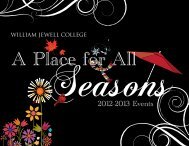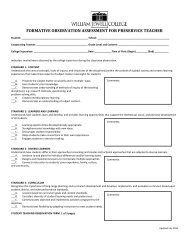Courses of Study - William Jewell College
Courses of Study - William Jewell College
Courses of Study - William Jewell College
You also want an ePaper? Increase the reach of your titles
YUMPU automatically turns print PDFs into web optimized ePapers that Google loves.
<strong>Courses</strong> <strong>of</strong> <strong>Study</strong> – General Education<br />
culture (including such topics as religion, social<br />
norms, economy, racial and ethnic concerns, and<br />
political events) <strong>of</strong> specific countries and regions <strong>of</strong><br />
the world will add to a greater understanding <strong>of</strong><br />
women’s experience <strong>of</strong> these novels and their<br />
search for identity, fulfillment, and self-expression.<br />
Brief discussion <strong>of</strong> theory concerning women’s<br />
writing will add to the students’ appreciation <strong>of</strong><br />
the act <strong>of</strong> writing as a mode <strong>of</strong> self-expression and<br />
self-exploration as well as an act <strong>of</strong> communication.<br />
(Interdisciplinary humanities course)<br />
209. Culture in Transition. 4 cr. hrs. Culture in<br />
Transition will examine the European culture,<br />
including England, in a period <strong>of</strong> change, the thirteenth<br />
and fourteenth centuries. The course will<br />
involve the disciplines <strong>of</strong> visual art, literature, religion,<br />
as the art and literature <strong>of</strong> the culture reveal<br />
paradigm shifts away from the traditional religious<br />
order. (Interdisciplinary humanities course)<br />
210. Film Worlds. 4 cr. hrs. This course uses<br />
films as texts in order to explore the social, historical<br />
and cultural contexts the films depict. Interdisciplinarity<br />
is sought in the methods roughly analogous to<br />
those used in literary and historical investigation.<br />
The course will introduce students to new ways <strong>of</strong><br />
seeing; they will watch a film against a complex<br />
matrix <strong>of</strong> interdisciplinarity that will confront their<br />
own cultural assumptions. (Interdisciplinary<br />
humanities course)<br />
211. Seeing is Believing: The Iconography <strong>of</strong><br />
Suffering and Compassion. 4 cr. hrs. The<br />
course explores how the iconography <strong>of</strong> Buddhists<br />
and Christians portrays the relationship between<br />
suffering and compassion and what difference<br />
these visual representations make in the respective<br />
ethical traditions. The course draws upon the disciplinary<br />
approaches <strong>of</strong> Art History and Religious<br />
Studies in its examination <strong>of</strong> both written texts and<br />
visual art. (Interdisciplinary humanities course)<br />
212. Literatures and Cultures <strong>of</strong> Africa. 4 cr. hrs.<br />
A study <strong>of</strong> some <strong>of</strong> Africa’s greatest writers and<br />
filmmakers in English or in translation. The course<br />
explores the rich variety <strong>of</strong> African cultural expression.<br />
The importance <strong>of</strong> oral literature and popular<br />
culture will also be considered. Students write regularly<br />
in response to assigned readings and film<br />
viewings. (Interdisciplinary humanities course)<br />
Sacred and Secular Interdisciplinary<br />
<strong>Courses</strong> in Religious Studies:<br />
225. Christ and Culture. 4 cr. hrs. This course<br />
will examine the ways in which significant<br />
Reformation figures integrated biblical law and<br />
gospel into their understanding <strong>of</strong> the meaning and<br />
import <strong>of</strong> Christian faith. Students will evaluate<br />
their reading and class discussion <strong>of</strong> various reformers’<br />
ethical dilemmas through written quizzes, written<br />
essay exams and longer argumentative essays.<br />
(Interdisciplinary humanities/religion course)<br />
226. Religion and Meaning. 4 cr. hrs. This class<br />
will explore how religion, particularly the religion<br />
<strong>of</strong> the biblical tradition, serves to guide people in<br />
the creation <strong>of</strong> meaning for understanding both<br />
the world they live in and its ethical structures.<br />
Using biblical texts and secondary readings from<br />
the discipline <strong>of</strong> sociology, students will explore<br />
specifically the secularizing effects <strong>of</strong> modernization<br />
on religion and ways that various religious traditions<br />
have responded to the problem <strong>of</strong> secularism.<br />
(Interdisciplinary humanities/religion course)<br />
228. Religion as Literature. 4 cr. hrs. This<br />
course will juxtapose the works <strong>of</strong> ancient<br />
Hebrews and Greeks in order to illuminate both,<br />
and finally, to illuminate the work <strong>of</strong> Jesus <strong>of</strong><br />
Nazareth as anti-establishment prophet and messiah.<br />
Students will write daily and <strong>of</strong>fer extended essays<br />
as means <strong>of</strong> analyzing both reading and class discussion.<br />
(Interdisciplinary humanities/religion course)<br />
229. Christianity and Tyranny. 4 cr. hrs. Using<br />
the disciplines <strong>of</strong> literature and theology, this<br />
course addresses the question <strong>of</strong> how one can live<br />
under a repressive regime. Through close reading,<br />
class discussion and the presentation <strong>of</strong> a position<br />
paper, students will apply biblical principles to the<br />
ethical dilemmas raised by this question <strong>of</strong><br />
responding to tyranny. (Interdisciplinary humanities/religion<br />
course)<br />
231. Biblical Messianism and Handel’s Messiah.<br />
4 cr. hrs. This course examines the modes <strong>of</strong> 17th<br />
and 18th century biblical interpretation that stood<br />
behind the composition <strong>of</strong> Charles Jennens’ libretto<br />
to Handel’s Messiah. Students will demonstrate<br />
their understanding <strong>of</strong> a variety <strong>of</strong> musical, theological,<br />
and biblical topics through written<br />
responses to aural exercises, oral presentations,<br />
74


